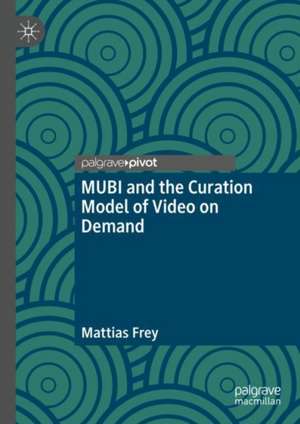MUBI and the Curation Model of Video on Demand
Autor Mattias Freyen Limba Engleză Hardback – 13 aug 2021
Preț: 469.22 lei
Preț vechi: 552.03 lei
-15% Nou
Puncte Express: 704
Preț estimativ în valută:
89.79€ • 96.01$ • 74.86£
89.79€ • 96.01$ • 74.86£
Carte tipărită la comandă
Livrare economică 17 aprilie-01 mai
Preluare comenzi: 021 569.72.76
Specificații
ISBN-13: 9783030800758
ISBN-10: 303080075X
Pagini: 150
Ilustrații: XI, 168 p. 9 illus., 3 illus. in color.
Dimensiuni: 148 x 210 x 19 mm
Greutate: 0.37 kg
Ediția:1st ed. 2021
Editura: Springer International Publishing
Colecția Palgrave Macmillan
Locul publicării:Cham, Switzerland
ISBN-10: 303080075X
Pagini: 150
Ilustrații: XI, 168 p. 9 illus., 3 illus. in color.
Dimensiuni: 148 x 210 x 19 mm
Greutate: 0.37 kg
Ediția:1st ed. 2021
Editura: Springer International Publishing
Colecția Palgrave Macmillan
Locul publicării:Cham, Switzerland
Cuprins
1 Introduction.- 2 Curation as Discourse, Trend and Cultural Salve.- 3 The Curation Business Model.- 4 MUBI History: Connections, Community and Curation.- 5 Recommendation Credibility in the MUBI Interface.- 6 The MUBI Audience.- 7 At the End of the Long Tail.
Notă biografică
Mattias Frey is Professor of Film, Media and Culture at the University of Kent, UK. He is the author or editor of eight books, including The Permanent Crisis of Film Criticism (2015); Film Criticism in the Digital Age (co-edited with Cecilia Sayad, 2015); and Netflix Recommends: Algorithms, Film Choice, and the History of Taste (2021).
Textul de pe ultima copertă
Subscription video on demand (SVOD) represents the fastest-growing means to consume films and series. Although market leaders Netflix and Amazon Prime have received much scholarly attention for the way that they use algorithms and big data to connect users to content, there is another significant, relatively unexamined model: curation-style services such as BFI Player, IFC Unlimited, the Criterion Channel or MUBI — the latter, which forms the focus of this book, claims to be the world's most subscribed independent video on demand service. These platforms take advantage of common anxieties about algorithms, cultural surplus and filter bubbles to promote discovery, human-generated recommendations and quality over quantity of content. Deploying an original, holistic methodology that includes analysis of technological affordances, marketing rhetoric, business models, interviews with company executives and a qualiquantitative audience study, this book critically analyses MUBI as a way to understand this particular mode of content aggregation, cultural recommendation, choice architecture and community building. Curation services address a real, but decidedly circumscribed gap in the market. Ultimately, MUBI offers film, media and business scholars an instructive example of the fate of art cinema and media diversity in a digital culture increasingly dominated by a few giant tech companies.
Mattias Frey is Professor of Film, Media and Culture at the University of Kent, UK. He is the author or editor of eight books, including The Permanent Crisis of Film Criticism (2015); Film Criticism in the Digital Age (co-edited with Cecilia Sayad, 2015); and Netflix Recommends: Algorithms, Film Choice, and the History of Taste (2021).
Mattias Frey is Professor of Film, Media and Culture at the University of Kent, UK. He is the author or editor of eight books, including The Permanent Crisis of Film Criticism (2015); Film Criticism in the Digital Age (co-edited with Cecilia Sayad, 2015); and Netflix Recommends: Algorithms, Film Choice, and the History of Taste (2021).
Caracteristici
Provides the hitherto most comprehensive analysis of MUBI, the world’s most subscribed independent SVOD service Defines and anatomizes a broader spectrum of curation-style VOD services that seek to eschew algorithmic recommendation provide content diversity and expand users’ tastes in a digital age frequently seen to suffer from filter bubbles Provides a new, holistic methodology that uniquely mitigates digital media companies’ lack of candour, especially regarding their user base, by triangulating a whole host of data sources
